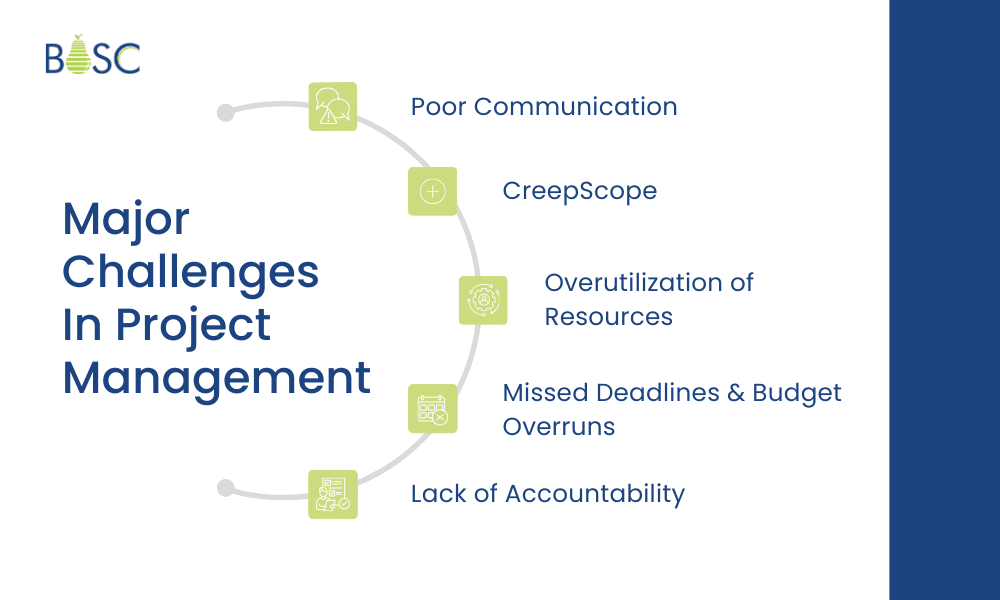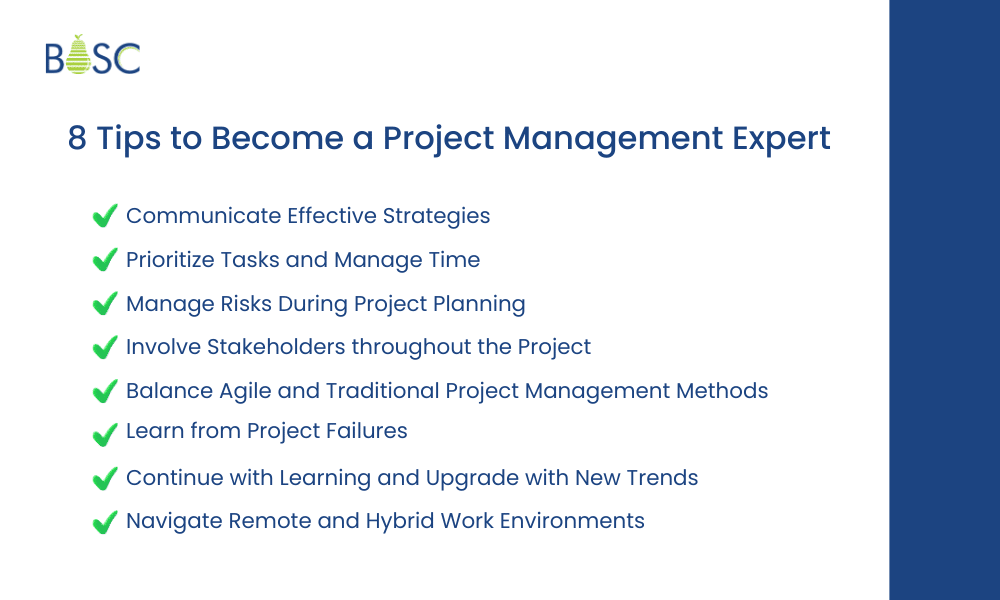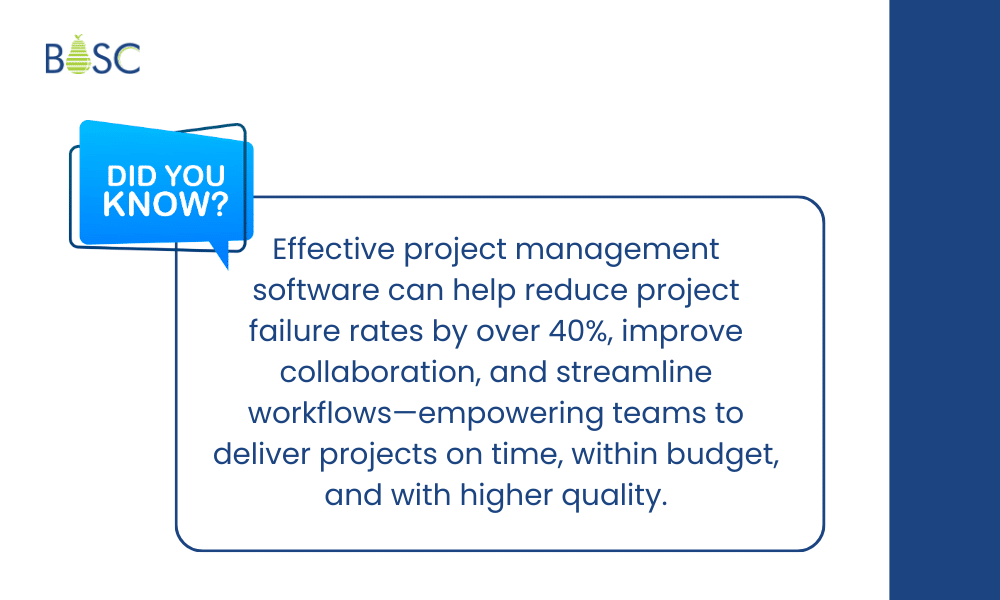There is always room for improvement and development in the project management. There have been so many emerging industry trends, and newer technologies are coming so rapidly that you need to be able to track and adapt to be effective. Two decades ago, project management skills were required only for those who managed large-scale projects; today, this industry has undergone many transformations. With the best collaborative project management tools in the market, the market is becoming more open to budding leaders.
Before we move into exploring how to gain expertise in project management, let’s discuss the key challenges in the role.
Major Challenges In Project Management: Problems and Some Solutions
A project is a complex organization between the end of planning and the commencement of the project. Any delay within this organization leads to the eventual failure of the whole plan. Anyone who tells you otherwise is just trying to kill you. Anyway, let’s talk about some of the common challenges one faces while managing any project.
If you want to know more about the Project Management Challenges and Solutions, click here.
1. Poor Communication
Have you ever composed an important email, only for it to be lost in someone’s inbox? Poor communication results in disorganization, delays in deadlines, and exacerbation. It gets messier with remote teams, where communication is scattered across emails, chats, and calls. Having no clear updates and expectations causes things to go haywire in no time.
2. CreepScope ( “Just One More Thing…”)
Here is what you usually face at the start: you have created a workable action plan, but one point needs to be added after another with nothing changed in terms of deadlines and resources. Ring a bell? This is a typical case of scope creep, and trust me once it gets into your organization with poor basic setup and belief, it can trap the entire team, delay its planned schedules, and virtually ruin budgets.
3. Overutilization of Resources
Some team members have way too much work, while some do nothing—it’s frustrating. Where communication and resource management go astray, you will see one group tamed by burnout buckets bottlenecking their schedule! When there is no effective tracking, it’ll be pretty much impossible to balance out the workload.
4. Missed Deadlines & Budget Overruns
One dropped ball could lead to days wasted due to technical issues, supply chain glitches, or other last-minute curveballs—any of which could compromise the allocated timeline and budget. When teams don’t do enough risk management, they end up scrambling to meet their deadlines, which leads to rushed, poor-quality work.
5. Lack of Accountability
Has there ever been a case when one of your tasks fell off the edge of the world because nobody was aware of whose job it was? With clear and definite assignments, tasks get delayed, and everyone turns to blame whoever is to be responsible.
Dealing with the Problem: How to Turn into a Project Management Expert
Mastering strategic tools and methodologies is essential in overcoming the hurdles of the workplace. From Agile frameworks to AI-driven automation, businesses leverage various technologies to significantly improve the efficiency and decision-making in the business.
Project management solution by BOSC Tech Labs is designed and developed to help professionals streamline workflows, enhance collaboration, and drive success. Whether you need real-time tracking, risk assessment, or automated reporting, our experts equip you with a better journey.
8 Tips to Become a Project Management Expert
1. Communicate Effective Strategies
Communication plays a paramount role in any project. In the project management role, there will be continuous interaction with different stakeholders, team members, and upper management. If there is any friction in communication, it will lead to misunderstandings, missed deadlines, and even project failure. Here are some ways to improve communication:
- Set clear Expectations: During the beginning of the project, you must ensure that every participant has understood their role and responsibilities clearly. It will keep everyone on the same page.
- Use Collaboration Tools: Collaboration tools like Microsoft Teams, Slack, and other tools are available.
- Hold Regular Meetings: Consistent meetings help track the progress of the project and identify any roadblocks that may arise.
2. Prioritize Tasks and Manage Time
In project management, identifying the priority of tasks and assigning them accordingly in the pipeline is highly crucial. With multiple tasks and limited time, it becomes an essential project management practice to identify what needs to be done first. Here are some tips:
- Use Project Management Tools: Project management tools like Trello, ClickUp, Jira, and others allow for creating task lists, assigning deadlines, and tracking progress.
- Time Blocking: You can block time for particular tasks as per requirements, ensuring that high-priority tasks get the time they require.
- Delegate Tasks: In project management, the delegation of tasks to team members should be according to their strengths and weaknesses.
3. Manage Risks During Project Planning
There is a certain level of risk in every project. As a project manager, it is your responsibility to identify, assess, and mitigate those risks. Implementing the below-mentioned project management tips will help you mitigate risks and prepare for unforeseen challenges.
- Early identification of risks: You must be able to foresee potential risks at the planning stage. It could be budget constraints, limited resources, limited time, or technical challenges.
- Conduct a SWOT analysis: SWOT (Strengths, Weaknesses, Opportunities, Threats) analysis will help you evaluate both internal and external factors that could impact the project.
- Create a contingency plan: After identifying risks, you must develop strategies to mitigate them. The strategies could be adding extra resources, buying more time from the client, or preparing backup solutions.
- Monitor Risks throughout the Project: Risk management isn’t a one-time task. You have to continuously assess risks with the progression of the project and adjust the plan accordingly.
4. Involve Stakeholders throughout the Project
Stakeholders play a critical role in the project. Their knowledge and feedback are invaluable for the success of any project. Thus, you must manage all the stakeholders effectively to prevent misunderstandings and ensure alignment with project initiatives.
- Maintain Communication: Just like with team members, you should also conduct regular meetings with the involved stakeholders and keep them informed of progress, roadblocks, or any changes in the project.
- Tell Stakeholders about Key Milestones: During the completion of any critical phases of the project, you must inform all the stakeholders. It includes phases like project kickoff, mid-point reviews, and final delivery.
5. Balance Agile and Traditional Project Management Methods
In today’s dynamic environment, no single project management approach is successful. A blend of multiple approaches, such as agile methodology and waterfall, can help achieve the desired results.
- Agile for Flexibility: Agile methodologies like Scrum are highly suited for projects that can have multiple iterations during the project execution. Agile encourages collaboration, adaptability, and incremental progress.
- Waterfall for Structure: If the project is well-defined with little or no scope for changes, then the waterfall is most suited. It provides a structured and sequential approach.
- Hybrid approaches: Most projects today benefit from a hybrid approach, where agile is used for specific aspects like development, while waterfall is employed for planning and documentation.
6. Learn from Project Failures
Even with all the training and motivation that goes into the striving for success, failure often gives you more experience, more knowledge, and more insight than does continued success. Failures in a project often give incisive lessons that should be used in maintaining and improving future projects.
- Post-Project Reviews: After the project is concluded, conduct a retrospective meeting in order to analyze which aspects went wrong and in what manner the situation might have been dealt with differently. Such meetings reflect the areas that need improvement.
- Continuous Improvement Culture: Let your team see each failure as an opportunity to grow. Build a climate in which feedback is welcomed and lessons from blunders are shared.
7. Continue with Learning and Upgrade with New Trends
It is very important to stay updated regarding the new technologies and trends in this fast-evolving technological world. Learn all about setting trends in project management, in terms of newer concepts, tools, and technologies.
- Attend industry conferences: Conferences and seminars are the windows of opportunity to glean information shared by the best and to stay on the up-and-up with changes in project management.
- Make use of emerging technology: Keep yourself updated on all new developments like AI, machine learning, and automation that can be used to enhance compliance with situations in the project management process.
8. Navigate Remote and Hybrid Work Environments
Project managers will have to change their strategies to ensure seamless collaboration as remote and hybrid work models become a norm. In the absence of a physical office, maintaining engagement, productivity, and alignment comes as a big challenge to the teams meeting virtually. Clear communication is key-project managers should invest in suitable project management tools, video conferencing software, and instant messaging platforms to keep teams connected. Setting explicit goals, expectations, and deadlines allows for accountability, and regular virtual check-ins keep workflows from falling off track. Encouraging team engagement via collaboration platforms coupled with fostering an open culture enhances productivity. By leveraging the right tools and strategies, project managers connect remote and office teams seamlessly.
Wrapping Up
To become a project management expert, one must bear in mind all aspects of strategic planning about teamwork, automation, and lifelong learning. By applying the 8 secret tips, one can streamline processes, minimize risks, and wise up to successful project management.
From action plans to automation and real-time tracking powered by AI, with these weapons in hand, you can assure yourself and stay ahead of the competition in the marketplace. Project management tools are, however, designed to make workflows easier and boost the collaboration of the team for deliveries on time.
BOSC Tech Labs (www.bosctechlabs.com) provides edge-of-the-art project management solutions that equip professionals to work smart and agile. Whether advanced task tracking, seamless integrations, or AI-powered analytics, we have all the tools that can streamline your projects.
Elevate your project management skills to a new level! Call us today for a free consultation and see how our solutions can expose you to success for your projects.
Master Project Management Today!
Get expert tips to grow your project management skills now!
Get Started Today!







